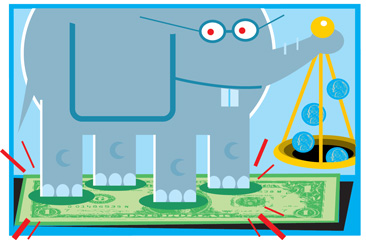Bar association flattens
fees to lure consumers
By Psyche Pascual
Staff Writer
In a move to remain
competitive with online companies that use the web to offer consumers low-cost
legal services, California’s largest voluntary bar association has launched its
own flat fee service.
 The Los Angeles County Bar
Association began offering flat fees in April through its existing lawyer
referral service SmartLaw.org.
With nearly 24,000 members in Los Angeles, Riverside, San Bernardino and
Ventura counties, LACBA is also among the largest voluntary bars in the United
States.
The Los Angeles County Bar
Association began offering flat fees in April through its existing lawyer
referral service SmartLaw.org.
With nearly 24,000 members in Los Angeles, Riverside, San Bernardino and
Ventura counties, LACBA is also among the largest voluntary bars in the United
States.
The association’s move was
sparked in part by competitive pressures from the online legal services
companies already charging flat fees for simple document filing, such as wills
and business forms. Some brick-and-mortar law firms and sole practitioners that
normally charge hourly, also advertise flat fees for simple legal cases,
including criminal law.
“Consumers have become accustomed to
these types of services. … Consumers are purchasing all types of goods online,”
said Seth Chavez, director for LACBA’s lawyer referral service. “That’s where our program has gone. It’s the
larger picture of what consumers are used to experiencing in the market place.
That’s what the legal services market has capitalized on.”
Consumers will be charged flat
fees for only three types of legal services: $800 for an uncontested divorce,
$800 to file forms for a limited liability company and $500 to register a
trademark. Those amounts cover only attorneys’ fees and do not include extras,
such as filing fees and postage. In return, attorneys pay an annual fee to get
referrals from the service.
Chavez said consumer response
so far has been so positive that LACBA may add other kinds of legal cases to
the flat fee program within the year. He hopes to attract experienced
consumers, those who know the cost of legal services, as well as people who
know nothing. “Flat fees offerings help consumers to better understand
the costs,” he said. “They put some of the myths about the costs of legal
services to rest.”
LACBA’s foray into flat fee legal
services has already sparked interest among other voluntary bar associations competing
with online legal service firms, including Rocket
Lawyer, Avvo and LegalZoom.
Online legal services firms
attract consumers with do-it-yourself forms for consumers who need basic
services, such as starting and running a small business, drafting simple wills
or completing a simple divorce with low fees, often under $100.
According to a 2015 report by
market research firm IBIS World, the online legal services market generates more
than $4 billion a year and is expected to grow about 10 percent annually in the
next decade. About 52 percent of consumers who use online legal services are
individuals and about 41 percent are business owners, according to the report.
Other bar associations around
California were quick to praise the LACBA’s flat fee business model and are
watching to see what kind of response it gets from consumers. Carole Conn,
director of the 7,500-member Bar Association of San Francisco’s Lawyer Referral
and Information Service, said legal referral services across the state are due
for a shakeup.
“We are absolutely watching
[LACBA’s program] very closely,” Conn said. “We’re all rowing in the same
direction. One would be a fool to stick your head in the sand and pretend these
changes aren’t meaningful.”
Barbara Arsedo, lawyer
referral service and moderate means program coordinator for the roughly
1,500-member Contra Costa Bar Association, said offering flat fees make sense
for clients on the lower end of the economic scale.
“We have clients that don’t
meet the low-income criteria. They can’t afford the whole fee – hourly,
retainer – for an attorney,” Arsedo said.
But the response to flat fees
and other online legal services from attorneys has not always been positive.
In January, the American Bar
Association abandoned ABA Law Connect, a pilot program with partner Rocket
Lawyer that allowed consumers to ask a lawyer a question for only $4.95. The
program tested in California, Illinois and Pennsylvania was intended to offer
legal services to cash-strapped businesses. After drawing sharp criticism from
some voluntary bar association officials, it ended after only three months.
LACBA’s flat fee program also
generated some negative responses among attorneys initially. “Many
thought that this was a very bad idea, that the sky was going to fall,” Chavez said. But since its launch, LACBA has seen an
increase in attorneys joining the lawyer referral service. The association may even
add new types of flat fee services within the year, he said.
“I suspect that some bars
will integrate programs like this throughout the country once there’s been a
little feedback,” he said.
Consumers priced out of the
legal services market will continue to look for do-it-yourself alternatives,
others said. Only last February, the online legal firm Avvo.com expanded into
18 states – including California – by launching a service offering legal advice
by phone for a flat fee. Avvo has about 2,200 attorneys participating in its legal services, about
400 in California, according to Avvo officials.
Seattle-based Avvo CEO Mark
Britton said his firm found a
large market among consumers because a majority of them – up to 80 percent, he
said – can’t afford an attorney or find the process of hiring one painful.
Attorneys have to
overcome a huge obstacle: “Lawyers just make things complicated,” said Britton,
a former counsel for Expedia Inc. In the end, it will come down to customer
service, he added.
LACBA “absolutely has
a lot of credibility and part of their charge is to build products for the
consumer,” Britton said. “As far as us vs. them, we are talking about such a massive market that there
is room for a lot of different approaches.”